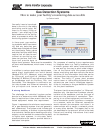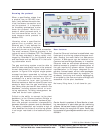
© 2004 by Sierra Monitor Corporation
Sierra Monitor Corporation 1991 Tarob Court Milpitas, CA 95035 USA (408) 262-6611 (800) 727-4377 Fax: (408) 262-9042
Visit our Web site: www.sierramonitor.com E-Mail: sierra@sierramonitor.com
Knowing the protocol
When a specification states that
a product has an RS-485 inter-
face, it only defines the serial elec-
trical hardware connection and
not the protocol. It is important
for the safety professional to also
know the protocol. While hun-
dreds of serial protocols exist in
the instrumentation world, the
most common serial protocol is
Modbus RTU.
Likewise, when a specification
states that a product has an
Ethernet port, it only defines the
form of the hardware interface,
commonly known as a Cat-5 cable connection.
The most common Ethernet protocol in the
industrial world is Modbus/TCP. The Modbus/
TCP de-facto standard is being rapidly chal-
lenged by EtherNet/IP in the industrial world
and standards such as BACnet/IP in the build-
ing automation world.
The gas monitoring system must be able to
hand off data and accept inputs in the protocol
format demanded by the plant-wide control
system. In Figure 2 the original single system
concept has been expanded to indicate that
multiple gas detection controllers might be
connected via a serial interface, but the pri-
mary Information layer now includes an
Ethernet backbone. Now multiple PCs can have
access to data from the gas monitoring sys-
tem. Many other devices will also reside on the
backbone, including process control or moni-
toring equipment, building management de-
vices and control room systems.
Critical to the ability to connect to the plant
backbone is the Communications Bridge or
Gateway. This device enables hardware plat-
form and protocol conversion interoperability
between dissimilar systems and the backbone.
The safety professional can breathe a sigh of
relief because his choice of monitoring system
is no longer restricted to the backbone proto-
col.
New features
Once the Ethernet interface is established, new
features of monitoring systems become avail-
able. Possibly the most useful is a Web server
function. A Web server can be installed in the
Communications Bridge/Gateway or in another
Ethernet node so authorized personnel have
desktop access to graphical representation of
the gas monitoring system status. Graphical
representation is no longer relegated to ex-
pensive, license-based, control room packages.
Other features include report by exception, re-
dundancy functions and remote datalogging,
all enabled by the Communications Bridge and
accessible via the plant backbone.
No heavy lifting here, it is all done for you.
Gordon Arnold is president of Sierra Monitor, a lead-
ing manufacturer of plant-wide gas risk monitoring
systems. He has been closely involved in the gas de-
tection industry for more than 25 years. Gordon can
be contacted at garnold@sierramonitor.com or (408)
262-6611.




